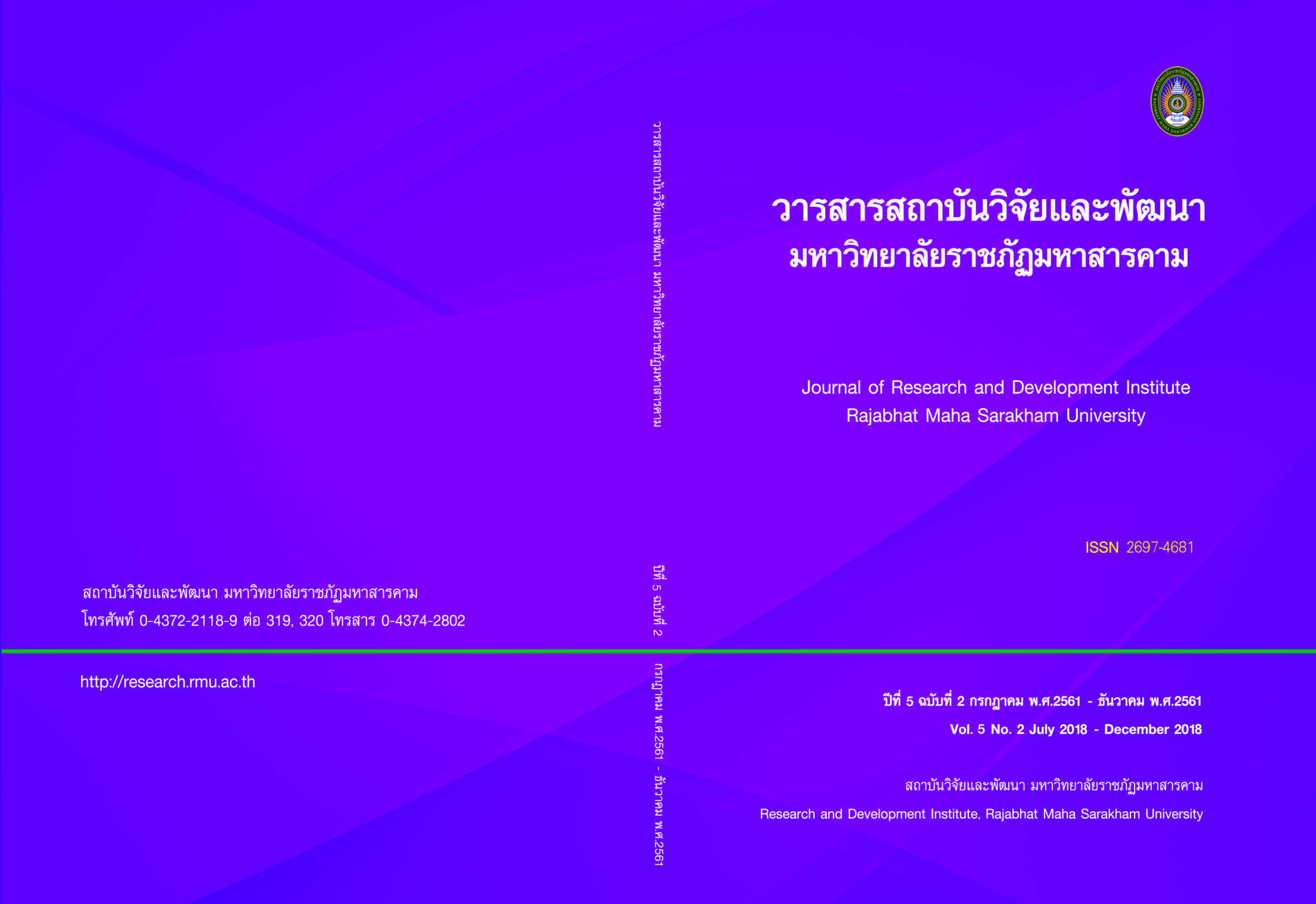Administration for the Intellectual Property Protection of Rajamangala University of Technology
Keywords:
Administration, Intellectual Property Protection, Rajamangala University of TechnologyAbstract
The purposes of this research were to study; 1) problems of administration, 2) development guidelines of administration, and 3) important factors effecting to development guideline success of administration for the success intellectual property protection of Rajamangala University of Technology. The questionnaire was used as a tool to collect the data. The population consisted of academic staffs and 9 faculty members of the Rajamangala University of Technology. The 874 samples were selected and the 607 questionnaires were collected from all samples. The descriptive analysis was used to analyze data including : frequency, percentage, mean, and standard deviation. In terms of qualitative research, the deep interviews were applied to support the quantitative research. From the results, showed that (1) The Rajamangala University of Technology had the problems of intellectual property protection in moderate level and they should develop the administration in moderate level too. (2) The significant administration problem was the intellectual property protection encouragement of Rajamangala University of Technology was not enough. (3) The contribute significantly to the administration development approach was the Rajamangala University of Technology should encourage the staffs to pay attention about the protection of intellectual property as much as possible. Moreover, the effective administration development approach to improve the administrators of Rajamangala University of Technology was the good vision and clear policy of board about the intellectual property protection. And the implement of modern technology also facilitate and enhance the administration.
References
Department of Intellectual Property. (2010). Intellectual Property Management for Educational Institutions or Governmental Innovation Organizations. Nonthaburi : Intellectual Property Management Support Group, Intellectual Property Center, Ministry of Commerce. [In Thai].
Dubrin, A.J, and Ireland, R.D. (1993). Management and Organization. Ohio : South-western.
Gordon V. and Russell L. (2002). Intellectual Property : 2002 Cumulative Supplement : Licensing and Jint Venture Profit Strategies. 2nd edition : John Wiley & Sons; Hair, J. F., Black, W. C., Babin, B. J., and Anderson, R. E. (2010). Multivariate Data Analysis. 7th edition. Upper Saddle River, N. J. : Prentice-Hall.
Kannika Jarournpan and Sampan Polpuk. (2017). “Administration of the Elephant Village in Surin Province According to the Sufficiency Economic Philosophy Model”. EAU HERITAGE Journal (Social Science and Humanity), 7 (2) : May-August 2017. [In Thai].
Rajamangala University of Technology Thanyaburi. (2017). Faculty of Engineering Announcement on the Issue of Criteria for Closing the Research Project of the Faculty of Engineering. Pathum Thani : Rajamangala University of Technology Thanyaburi. [In Thai].
Rajamangala University of Technology Thanyaburi. (2018). Action Plan for the Fiscal Year 2018. Pathum Thani : Rajamangala University of Technology Thanyaburi. [In Thai].
Rajamangala University of Technology. (2013). Academic Personnel Related to Intellectual Property. Report on Performance of the Unit of the Intellectual Property Management and Technology Transfer. Pathum Thani : Unit of intellectual property management and technology transfer of Rajamangala University of Technology. [In Thai].
Thongsak Sinwimol and Wirat Wiratnipawan. (2016). “Development of Agricultural Administration of Phra Nakhon Si Ayuthaya Province According to the Sufficiency Economy Philosophy”. EAU HERITAGE Journal (Social Science and Humanity), 6 (2) : May-August 2016. [In Thai].
Wirat Wiratnipawan. (2007). Management According to Morality and Pholosophy of Sufficiency Economy. Bangkok : Fourpace. [In Thai].
Yamane, T. (1967). “Elementary Sample Theory”. Englewood Cliffs. New Jersey : Prentice-Hall.
Downloads
Published
How to Cite
Issue
Section
License
Articles that are published are copyrighted by the authors of the articles







